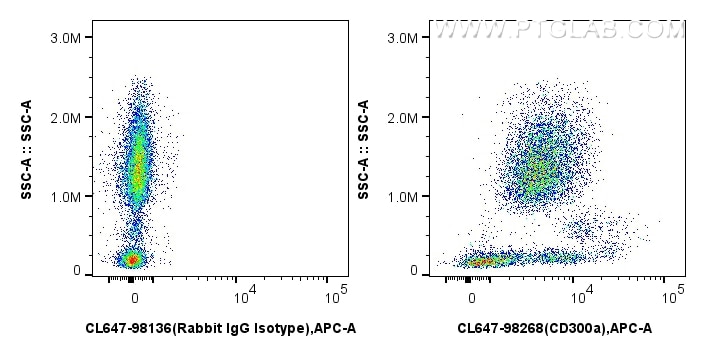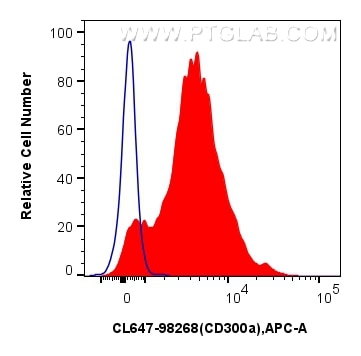Tested Applications
| Positive FC detected in | human peripheral blood leukocytes |
Recommended dilution
| Application | Dilution |
|---|---|
| This reagent has been pre-titrated and tested for flow cytometric analysis. The suggested use of this reagent is 5 ul per 10^6 cells in a 100 µl suspension or 5 ul per 100 µl of whole blood. | |
| Sample-dependent, Check data in validation data gallery. | |
Product Information
CL647-98268 targets CD300a in FC applications and shows reactivity with human samples.
| Tested Reactivity | human |
| Host / Isotype | Rabbit / IgG |
| Class | Recombinant |
| Type | Antibody |
| Immunogen | Recombinant protein Predict reactive species |
| Full Name | CD300a molecule |
| Calculated Molecular Weight | 33 kDa |
| GenBank Accession Number | NM_007261.4 |
| Gene Symbol | CD300a |
| Gene ID (NCBI) | 11314 |
| Conjugate | CoraLite® Plus 647 Fluorescent Dye |
| Excitation/Emission Maxima Wavelengths | 654 nm / 674 nm |
| Form | Liquid |
| Purification Method | Protein A purification |
| UNIPROT ID | Q9UGN4-1 |
| Storage Buffer | PBS with 0.09% sodium azide and 0.5% BSA |
| Storage Conditions | Store at 2-8°C. Avoid exposure to light. Stable for one year after shipment. |
Background Information
Human CD300a is a transmembrane protein, with an immunoglobulin (Ig)V-like extracellular domain and a cytoplasmic tail containing immunoreceptor tyrosine-based inhibitory motifs (ITIMs), providing the receptor with an inhibitory capacity. The relevance of the CD300a molecule in several pathological conditions has been highlighted by multiple studies. (PMID: 37762055)
Protocols
| Product Specific Protocols | |
|---|---|
| FC protocol for CL Plus 647 CD300a antibody CL647-98268 | Download protocol |
| Standard Protocols | |
|---|---|
| Click here to view our Standard Protocols |





